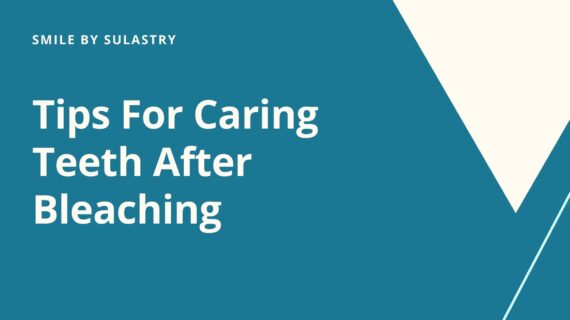Tips For Caring Teeth After Bleaching – Public awareness of appearance continues to increase nowadays, the demand for good dental appearance is also very high. One of the popular dental treatments lately is teeth whitening treatment or what is often called teeth bleaching.
This treatment is a way of restoring the discolored teeth back to the original tooth color through a chemical repair process. Bleaching treatments are widely chosen because the procedure is fast. Apart from that, tooth bleaching is also easy and effective to improve one’s appearance.
Yellowing teeth and dull teeth can cause discomfort. For that reason, not a few people do a variety of ways to whiten teeth as before. One way to do it is by bleaching the teeth.
Tooth bleaching is an action to increase the color of the teeth to be whiter than before. There are various types, including using the chemical substances hydrogen peroxide and carbamide peroxide with various concentrations.
Both of these compounds can help whiten teeth because they can penetrate the tooth layer and break down complex molecules of substances that cause discoloration.
Even though it sounds simple and effective, bleaching has a lot of rules that you must obey. The regulation is divided into two, namely the step before bleaching and the step after bleaching. Let’s look at the explanation here.
Also Read Dental Criteria That Can Use Braces For Maximum Results
Before Bleaching Your Teeth
Before knowing tips for caring teeth after bleaching, it is important that you know what to know if you want to do teeth bleaching.
First Consult to a Dentist
Now there are many types of teeth whitening/bleaching ingredients on the market. For maximum results, you need to consult a dentist first. In general, the dentist will:
- Helps to decide which type of bleaching is right for you. For example, suppose you want to choose a tooth bleaching procedure that takes 2 weeks. But actually, you are among those who are less diligent and only able to do it for 1 week. The doctor will advise you to choose a procedure that is 1 week only for maximum results.
- Conduct an in-depth examination of the condition of the teeth so that there are no problems when bleaching the teeth or afterward. For example, are there cavities, drooping gums, or other problems.
- Explains all procedures, side effects, costs, to your expectations of tooth bleaching. For example, the effect of bleaching cannot whiten dental fillings, crowns, or dental veneers.
- Provides care to reduce the effects of pain, especially for those of you who have sensitive teeth. Before the bleaching is done, giving high doses of fluoride and using toothpaste for sensitive teeth 2 weeks before can be done.
- Your dentist can also advise you to use a lower level of teeth whitening agents.
- Repairing teeth that need maintenance. If you want to whiten your teeth, there should be no tartar buildup and gingivitis that causes bleeding gums. Tooth with a cavity also needs to be filled first.
After Bleaching Your Teeth
Now, after you’ve finished bleaching your teeth, here are tips that you can apply to protect your teeth after bleaching. Usually, the dentist will recommend that you do the following.
To Overcome Pain
One of the side effects of tooth bleaching that may occur is tooth sensitivity or pain. This is actually normal. To overcome this, usually dentists will recommend home treatment by giving calcium paste containing CPP-ACP and using a special toothpaste for sensitive teeth.
Avoid Colored Foods or Drinks
During the first few days of the procedure, the dentist will recommend avoiding drinks that can stain and are acidic. For example, red wine, coffee, tea, soda, orange juice, soy sauce, and chocolate.
In the first few days, the pores of the teeth are still open and the chemical process of tooth bleaching is still ongoing (usually up to 2×24 hours).
At that time, the pores of the teeth are open so that the absorption of stains can occur faster than usual, which makes the teeth turn yellow again. To work around this, you can drink using a straw.
Remember, the results of teeth whitening are not permanent. Depending on your diet and habits, white teeth will last 6 months to 2 years.
Avoid Cold Drinks
After doing the bleaching procedure, you should avoid consuming cold drinks because your teeth will become more sensitive. Cold drinks can trigger toothache.
Avoid smoking
Patients are advised not to smoke after the bleaching procedure. This is because harmful substances in cigarettes can cause the appearance of teeth to become dull again, and trigger tooth decay and other members of the oral cavity.
Maintaining Tooth Color So It Does Not Fade
Bleached teeth usually last up to 2 years, but start to fade after 3 months. That’s why, do “maintenance” so that the color remains bright.
There’s it about Tips For Caring Teeth After Bleaching. Treatment can be done with whitening which is done at home once every 6 months, of course, under the supervision of a dentist. Tooth bleaching is indeed one solution for those of you who want a white and bright color
References :
